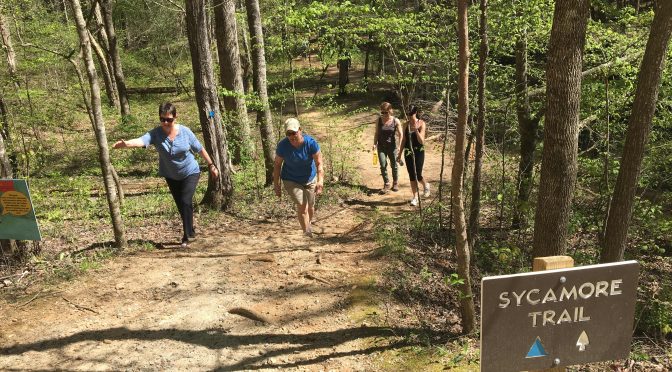Note: This post was updated at 8:30 a.m. on May 6 to reflect additional details on the phased reopening of North Carolina’s State Parks.
Under Phase 1 of the reopening of North Carolina in light of the coronavirus pandemic, “parks and trails are encouraged to reopen.”
That was one of several elaborations on Phase 1 made by Gov. Roy Cooper this afternoon during a coronavirus briefing. Phase 1 goes into effect Friday at 5 p.m.
North Carolina’s 29 state parks that have been closed (12 have remained open, with trails only) will reopen Saturday, says parks department Public Information Officer Katie Hall. That will include trails, most restrooms and most boat ramps. Visitor centers and other facilities will remain closed during Phase 1.
Under Phase 2, beginning May 22, camping will resume (except for group camps). Cabins will be open weekends only. Some beaches and designated swimming areas would open, as well as picnic areas, though with no reservations. All facilities would reopen under Phase 3, a date for which is to be determined.
We’ll let you know of more specifics as they become available. You can also find more detailed information about the phased reopening on the N.C. State Parks website.
In the meantime, here’s a look at the current status of our other major public lands:
North Carolina
Blue Ridge Parkway. Most trails along the parkway remain open, though restrooms and portable toilets, visitor centers, campgrounds, picnic areas, and concession operations are closed.
Great Smoky Mountains National Park. On May 9 (Saturday), the park, which has been essentially closed since April 4, will begin a phased reopening, focused on roads and trails. Which roads and trails were not specified in a release dated April 30.
“Campgrounds, picnic pavilions, visitor centers, and many secondary roads will remain closed during the first reopening phase, which is expected to last for at least two weeks,” the park reports on its website. To accelerate the second round of openings, the park will engage in “disinfectant fogging operations for restrooms and public buildings, installation of plexiglass shields at visitor centers, personal protective equipment requirements for maintenance workers, new safety protocols for emergency services staff, and reduced group size limits.”
Your best bet for the latest on what may be opening Saturday is to follow the park’s Facebook page.
Croatan, Nantahala, Pisgah and Uwharrie National Forests. There’s been no change in the status of the four national forests in North Carolina since April 13. You can find a rundown of all closures here, including the trails that were closed in the Pisgah National Forest on April 13, here.
Virginia
Shenandoah National Park. Closed on April 8, the park has yet to announce plans for a phased reopening. Last Friday, the park reported on its Facebook page that it was “working with our local communities and public health officials, as well as state and national guidelines to develop a phased plan for reopening that ensures the safety of Park staff, local communities, visitors, and resources.” Check their Facebook page for the latest.
George Washington and Jefferson National Forests. Closures include all campgrounds and recreation areas, portions of the Appalachian Trail on Forest Service property, the Virginia Creeper Trail and all shooting ranges. Otherwise, trails are open, though the Forest Service advises: “Stay Home Now, the Forest Will Wait Across the South, people are exercising close to home to comply with state and local guidance about not traveling for recreation. When shelter-at-home orders are lifted and public health and safety are restored, the forest will be waiting. Treasured places like national forests are being managed for everyone’s enjoyment far into the future.“
Virginia State Parks. All 38 parks in the system are open for day-use activities, including hiking, but closed otherwise until June 10 (“otherwise” closures include cabins, camping, restrooms and bathhouses). Keep updated at the State Parks website, here.
Both states
Appalachian Trail. The Appalachian Trail Conservancy, which oversees the 2,190-mile trail that passes through 14 states, continues to ask that people stay off the trail “to keep both the Trail and its broader community safe and healthy.” But with several states along the route relaxing or planning to relax stay-at-home orders, “the ATC has convened a task force to develop guidance on how A.T. visitors can re-engage safely with the Trail.” For updates on the task force’s recommendations and about the reopening of the trail, go here.
